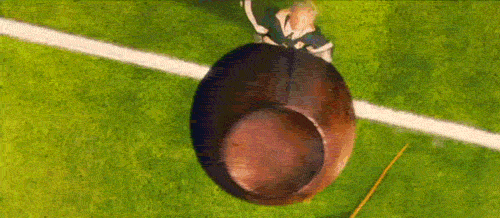The Dutch Quidditch Cup: Hard Work, Fun, and a Community That Deserves a Spotlight
Muggle quidditch is growing, not only in the US and Britain but in other countries as well. On a hot spring day late in May, the 2018 Dutch Quidditch Cup took place in Enschede, a city in the north of the Netherlands. MuggleNet followed the Dom Tower Dementors, a team started a couple of years ago by Nick van Klaveren, the coach of the team, and Chaser and primary Seeker Finn den Boeft. In the Netherlands, quidditch is growing fast. The result was that six of those teams, including the Dementors, were able to compete for the cup.
The Dementors played two games on the first day of the tournament: one against the Twentse Thestrals, the home team, and one against Lumos Eindhoven, the newest team in the competition. The Dementors, although short on players compared to many of the other teams, were on fire – after winning the cup last year, they were not planning on letting it go without a fight.
For those among us who aren’t aware, Muggle quidditch is a full-contact sport that combines elements of football, handball, and dodgeball. There are Chasers, Keepers, Beaters, and Seekers, just as in the magical version, but additionally, there are multiple referees and PVC tubes that substitute actual brooms. The matches tend to be around 20–25 minutes long, depending on when the Snitch (worn by an actual person called the Snitch Runner who runs around creating havoc in the form of a tennis ball in a sock hanging from their waist) is caught.
Quidditch isn’t just a fun side activity for Potter fans. As Ryan Pendavingh, one of the Beaters on the team, explains, “[Harry Potter] is definitely not the reason I joined [the team]. I was looking for a nice sport. It’s really something physical.” Many of his teammates agree, underlining how quidditch is a full-contact sport that has little to do with Potter once you’re out on the field. Still, Annemieke Drost, also a Beater, comments that she chose the sport because of the people, whom she lovingly calls nerds. “You gotta be a little bit weird [to play quidditch],” she adds.

The first match, against the Thestrals, was tough, and they ended up losing only because the Thestral Seeker caught the Snitch first. The Dementors congratulated them wholeheartedly; quidditch is a serious sport, but it also is all about respect and fun. The second match went better for our Dementors, and they ended up winning phenomenally, with a great Snitch catch by Fedor van den Meiracker, the team’s second Seeker. Eventually, the Dementors ended up in second place after a finale played, once more, against the Thestrals. Another close call, but the team was very happy with its silver, and in the end, everyone – all teams – celebrated together.

“The best thing quidditch has brought me is the community,” Annemieke says. “It’s really not something you find anywhere else easily.” Her teammates agree, highlighting how they’ve made friends from all over the world by attending events and matches abroad. To Fedor, the magic of quidditch is the combination of people and sport: “The community is great, but I also like having a sport where I have fun. You do a lot of different things that you cannot do in other sports.”
Today, some still see quidditch as something to laugh at. With the number of Dutch players doubling every year since 2015, however, many of the Dementors can’t wait for this to change. Ryan hopes that “more people will know about [quidditch] and also appreciate it as a real sport.” This seems only fair. With a group of people this driven, loving, and respectful, quidditch deserves to be acknowledged – especially in a more positive light. Quidditch may be something that started in the brain of the author of our favorite books, but it has since taken on a whole new meaning: It is a way of bringing people together, just like the Harry Potter books were for many of us. That deserves some celebration.


